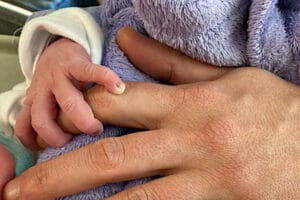When a woman opts to use a surrogate to carry her child, there are many questions that arise. The most common question is whether or not the baby is related to the surrogate. Here, we will explore the answer to this question and more.
What Is a Surrogate Mother and How Does the Process Work?
A surrogate mother is someone who carries and delivers a baby for another couple. Surrogate mothers are often referred to as Gestational Carriers because, unlike traditional surrogacy, no genetic connection exists between the surrogate and the baby. The process of becoming a surrogate begins when an individual shows interest in helping create a family for another couple. The qualification process is rigorous and may include physical health requirements as well as psychological testing.
Once qualified, the surrogate will work with both medical professionals and attorneys throughout the process of carrying a baby for another couple. This multi-faceted process helps to ensure the arrangement benefits you both physically, financially, and emotionally. In other words, it allows all parties involved to feel satisfied that their needs have been met and that this was a worthwhile endeavor.
How Is the Baby Related to the Surrogate Mother, if at All?
When it comes to understanding the relationship between a surrogate and the child born from that surrogacy, there are many important factors to consider. The legal and biological relationships between a mother and her surrogate have evolved over time due to new medical advances, and one of the most common questions that arise is whether or not there is any kind of bond between the surrogate mother and the baby. In short, it’s typically considered that the baby has no direct connection with the surrogate because the egg used to create the embryo was not donated by her body.
However, while there is no clear-cut relationship between a surrogate mother and the baby in question, many surrogates report feeling a strong emotional bond being forged in utero during pregnancy. That said, both parties must recognize that this bond should remain unspoken – as legally and biologically speaking, they are two separate entities.
Who Decides Whether or Not to Use a Surrogate Mother?
In the modern world, deciding to use a surrogate mother is not an easy decision by any means. Ultimately, the final decision rests with the intended parents looking to form or extend their family. Depending on whether or not they already have infertility treatments or are considering them, they will likely make their decision based on the guidance of both a fertility specialist and a lawyer that specializes in reproductive law.
It’s essential to understand all of the legal ramifications before making this commitment since there can be complex jurisdictional laws that vary from state to state when it comes to surrogacy. Additionally, couples also need to consider other important factors such as medical and financial implications when moving forward with using a surrogate. It’s really important for this couple to stay informed so that they can make an educated choice about their unique situation.
Are There Any Risks Associated with Surrogacy Arrangements?
Surrogacy arrangements can be extremely complex and have potential risks associated with them. As with any parenting arrangement, legalities surrounding the surrogacy process need to be thoroughly addressed, including questions about parentage, medical issues, and financial compensation. As such, it’s incredibly important for all parties involved to do their due diligence and consult relevant legal and medical professionals prior to entering into a surrogacy agreement. While the risks of surrogacy must be carefully considered, when done right these agreements can also be immensely beneficial to both intended parents and surrogates alike.
About Tammuz Family
A surrogate mother is a woman who carries and gives birth to a baby for another person or couple. The process of surrogacy usually involves in vitro fertilization, wherein the embryo is implanted into the surrogate’s uterus. The baby, therefore, is not biologically related to the surrogate mother. At Tammuz Family, we offer a full range of comprehensive and guaranteed IVF and surrogacy programs. We are an international surrogacy, fertility, and egg donation company. Our clients choose us for our one-stop-shop approach and low agency fees, which make our programs affordable and accessible to everyone. For more information about our surrogacy in Melbourne, Australia, write to info@tammuz.com or fill out our online contact form.

























